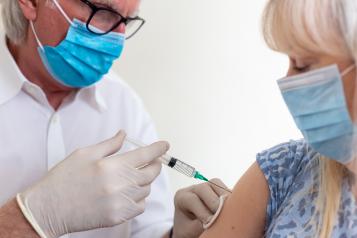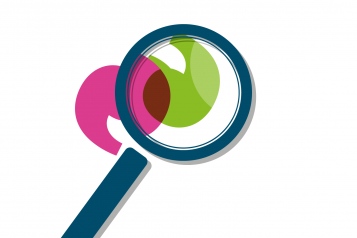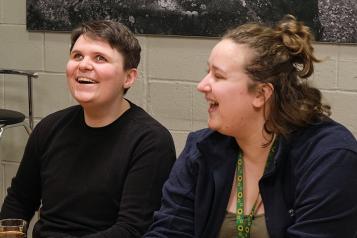Long Covid Case studies: Rebecca's Story

I am sure that much earlier intervention would have reduced the length of my recovery. Additionally, it has been very hard to understand what support is out there and how to get it.
Rebecca's Story
We heard from over 300 people in North Central London with Long Covid. Rebecca lives in Islington and completed our survey last Autumn. We then interviewed her over the phone in December 2021 to learn more about her experiences. Her name has been changed for anonymity.
Rebecca first fell ill in March 2020. By April 2020 she was out of work due to the severity of her illness. It took six months for Rebecca to get an initial referral for support.
For an entire year, she was unable to work and had to rely on state benefits. These were insufficient and the process damaged her self-esteem. Navigating the benefits system on an ongoing basis was extremely exhausting. The system does not make accommodations for people who have lost their jobs because of Long Covid. Like many people with the condition, she needed to access mental health support as part of her journey toward recovery.
Rebecca spent all her savings supporting herself during her illness. By the time of our interview, she had managed to return to work part-time. She was still unable to undertake any major form of exercise and continued to have to pace and plan her activities carefully. She felt she had only recovered to 80% of her old self.
Experiences of care
"At the time when I was most ill there was very little out there in terms of information and advisors did not really know what to say. I had to do my own research. I have been attending the UCLH Post Covid clinic but also heavily rely on social media platforms that support me.
I am sure that much earlier intervention would have reduced the length of my recovery. It has been very hard to understand what support is out there and how to get it.
With hospital clinics, I have received really good care and there’s an understanding of the realities of Long Covid from the patient perspective. Long Covid covers a huge range of symptoms, and a twenty-five-year-old can get Covid, be extremely sick and still be ill ten months later whilst a person in their sixties can get Covid then recover. In terms of understanding, outside of hospital it’s more varied, but I’ve been lucky. My GP surgery has been very good and my OT [occupational therapy] support has also been very good.
Early last year I felt completely alone. I can understand that they were prioritising people in hospital, but even this year there’s been a lack of support. People have Long Covid and are still exceptionally ill 21 months later. In terms of accessing support, I’ve used my own agency to get in front of people, but not everybody can do that."
Difficulties accessing appropriate mental health support
"I feel that the bottleneck in the system is getting the support and expertise that’s needed out into the boroughs. At the moment the knowledge and expertise is at the UCLH Long Covid clinic but they want to be able to refer people out to services in the community so they don’t get overloaded. The borough-level understanding isn’t there yet. There is insufficient support and expertise on Long Covid within services based in the community.
My iCOPE referral was dealt with really poorly. UCLH had already identified that I needed a deeper level of support, but I was only offered the standard Cognitive Behavioural Therapy service. If I hadn’t stood up for myself I would not have been able to access the [service I needed]."
No understanding of Long Covid within the benefits system
"I applied for Universal Credit. The process of going through that was really long-winded. Like many other people with Long Covid, I lost my job because I got ill and was no longer able to work. My cognitive processes were not functioning as they should as a result of the illness.
Navigating the benefits system was frustrating. I had to constantly obtain sick notes from my GP in order to keep my benefits. The system is based on proving that you are taking action to look for work. My key worker has over 300 clients to manage and hasn't heard of or doesn’t understand Long Covid and no accommodations are made. They just go through the questions they have to ask. I’m being asked why I haven’t done my CV yet. There’s no understanding that this isn’t possible. I've wasted so much energy going through the same thing over and over again. I stayed with it but I dread to think what happens to other people. They will fall off the system because they don’t have the energy to keep fighting."
What has helped?
Rebecca feels that peer support has been really valuable. This support comes via social media platforms rather than commissioned services. Facebook and Slack were given as examples of platforms with helpful communities. Rebecca specifically mentioned the ME [Myalgic Encephalomyelitis] and CFS [Chronic Fatigue Syndrome] communities as having been particularly supportive.
Despite long waits, and feeling that she has had to fight for access to the clinical support she has needed, Rebecca also feels that those services have been helpful in her ongoing recovery. However, not enough people with Long Covid know about these services. Nor is everyone able to advocate for themselves to make sure they receive support.
"Peer support provided validation that I wasn’t being anxious or making it up, that I didn’t want to be on benefits. The established ME and CFS communities have been brilliant. That’s where I learned the importance of not overdoing exercise. They are informal and give sufferers the opportunity to reflect on how alone we’ve felt.
I was lucky with my GP. I was assigned a locum and she had heard about the clinic that UCLH was setting up for Long Covid so she was able to make sure I got seen there. From there I’ve accessed the singing group [the ENO Breathe Programme], mental health support, occupational therapy at the Whittington, and the neurological team at St John’s Way. There’s a long waiting time [for the Islington Community Neurological Rehabilitation Team], but there are lots of people they could help who don’t know about the service.
If, as a borough, stakeholders are starting to listen to patients, that’s really going to help people with Long Covid."
Long Covid in North Central London
Healthwatch Islington worked in partnership with the other North Central London Healthwatch to gather local people's experiences of Long Covid. Our aims were to identify any gaps in current provision and support the better development of services and systems that help local people to manage their symptoms.
Long Covid usually presents with clusters of symptoms, often overlapping, which can fluctuate and change over time and can affect any system in the body. Recovery time varies for each patient but management and recovery are possible with the right support. Patients have had wide-ranging experiences when trying to access help from the healthcare system for Long Covid.


